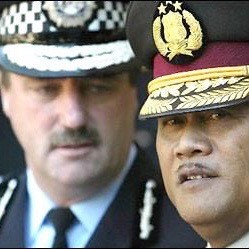AFP guidelines currently provide little restraint on police handing Australians over to potential death by execution overseas. Police should instead be forced to adopt and promote our human rights principles.
AFP rules must cause a pause
By Prof Simon Bronitt
Waking to the discovery that the death penalty by firing squad was finally delivered to the two Bali Nine ringleaders provoked varied emotions and reactions in Australia recently.
But managing Australia’s protest against Indonesia’s action will be challenging. Our protest risks the appearance of being selective and hypocritical since the US and China, two major world powers and key trading partners with Australia, remain leading practitioners of the death penalty to deal with terrorism, drug trafficking and other heinous crimes like murder.
Offenders in those jurisdictions routinely face death by firing squad or, in the case of the US, lethal and increasingly botched injections.
It is timely, though, to review our national position in relation to the limits of international police co-operation. In 2006, Federal Court Judge Paul Finn did just that in hearing an application to obtain disclosure of evidence relating to Australian Federal Police (AFP) policies and decisions relating to Scott Rush and three other Bali “mules”.
Scott’s father, Lee, had alerted police to his son’s plans to travel to Bali, asking them to intervene before his son departed. The AFP did not detain him, but alerted their Indonesian counterparts. The rest is history.

Could this happen again? Australia has placed clear legal limits on mutual assistance once a person is charged for an offence carrying the death penalty. The transfer of incriminating evidence or indeed suspects between the two legal systems is impossible without diplomatic assurances that the death penalty will not be applied.
The period before the suspect is charged is more complex. Police-to-police co-operation in cases that might ultimately end in the suspect facing a firing squad is not precluded.
In the Bali Nine case, Justice Finn found that there were no legal avenues open to Scott Rush to challenge the AFP actions. However, he called upon the AFP commissioner and minister to “assess the procedures and protocols” relating to police-to-police co-operation in such cases.
After the media frenzy died down, the AFP and the Attorney-General’s Department undertook that review. This resulted in a new AFP National Guideline on International Police-to-Police Assistance in Death Penalty Situations.
It is clearly a matter of vital public interest that Australia adopts a principled and consistent position in death penalty cases, one that applies equally to Indonesia and the US and China.
Yet this guideline, as originally drafted, was marked as “Only for Internal AFP Use”. Subsequently, in 2011, the guideline was released to the public under the Freedom Of Information Act 1982 (Cth) Information Publication Scheme, which is freely available on the AFP website.
The aim of the guideline is expressed in terms of Australia’s various international treaty obligations to facilitate police-to-police co-operation. By contrast, it remains silent about Australia’s international human rights obligation to eradicate the death penalty.
Rather than express a presumption against international police co-operation in cases potentially involving the death penalty, the guideline says AFP senior management must consider a range of “prescribed factors” before approving co-operation.
These factors include:
- the purpose and reliability of the information
- the seriousness of the suspected offences
- the nationality, age and personal circumstances of the person involved
- the potential risks to the person, and other persons, in providing or not providing the information. and, perhaps most significantly,
- Australia’s interest in promoting and securing co-operation from overseas agencies.
Apart from considering age and personal circumstances, the guidelines provides little room for a justifiable “cause to pause”. The security rationale of the guideline weighs too heavily against the human rights rationale. The guideline should be reviewed, drawing further input from senior police leaders, civil society and human rights experts.
The deaths should provide us all with cause to pause and think about the key messages we send to Australian police engaged in the global fight against crime.
* Prof Bronitt is Deputy Dean (Research) and Deputy Head of The TC Beirne School of Law at The University of Queensland. This article appeared first in The Conversation online journal.

